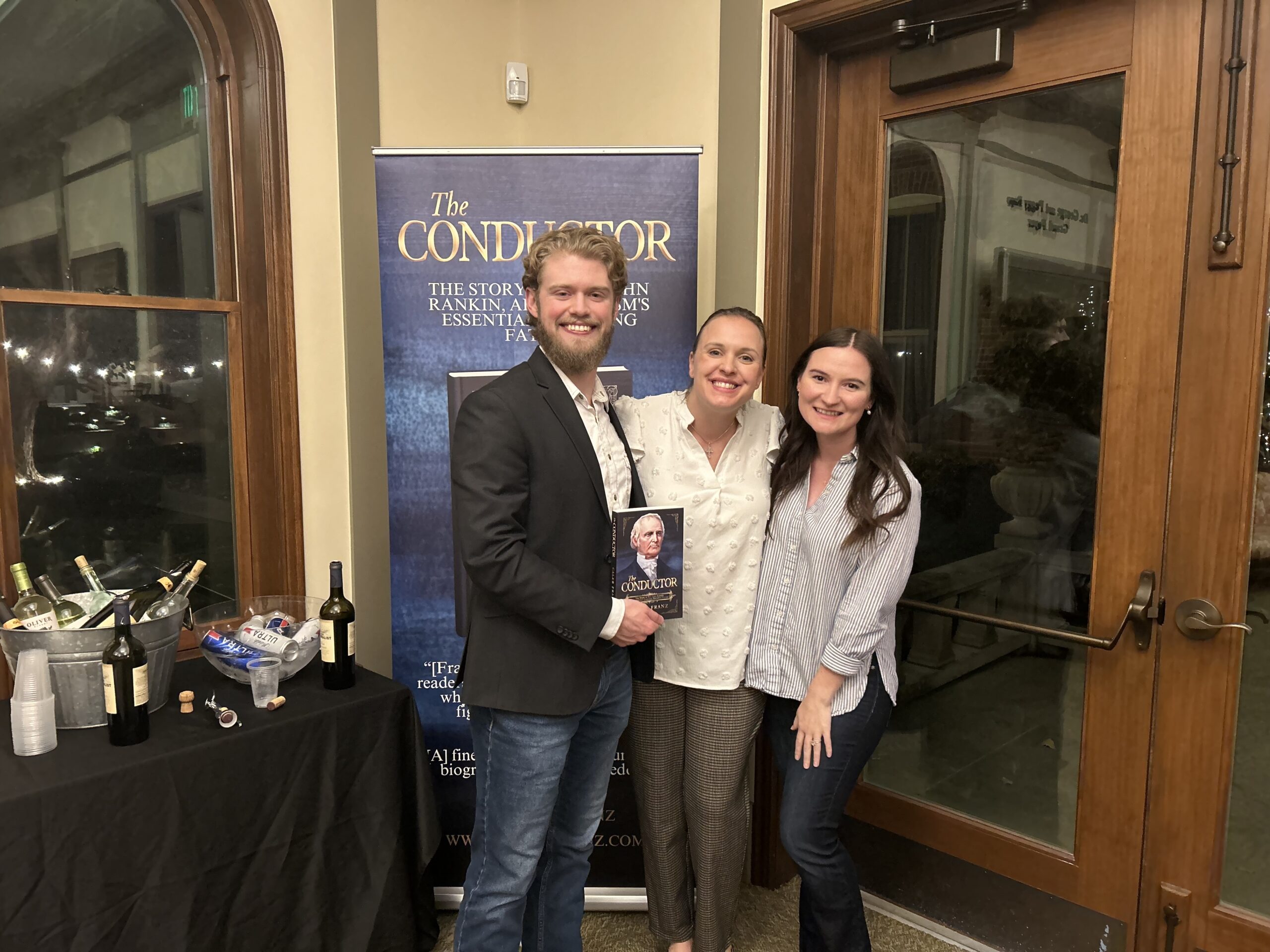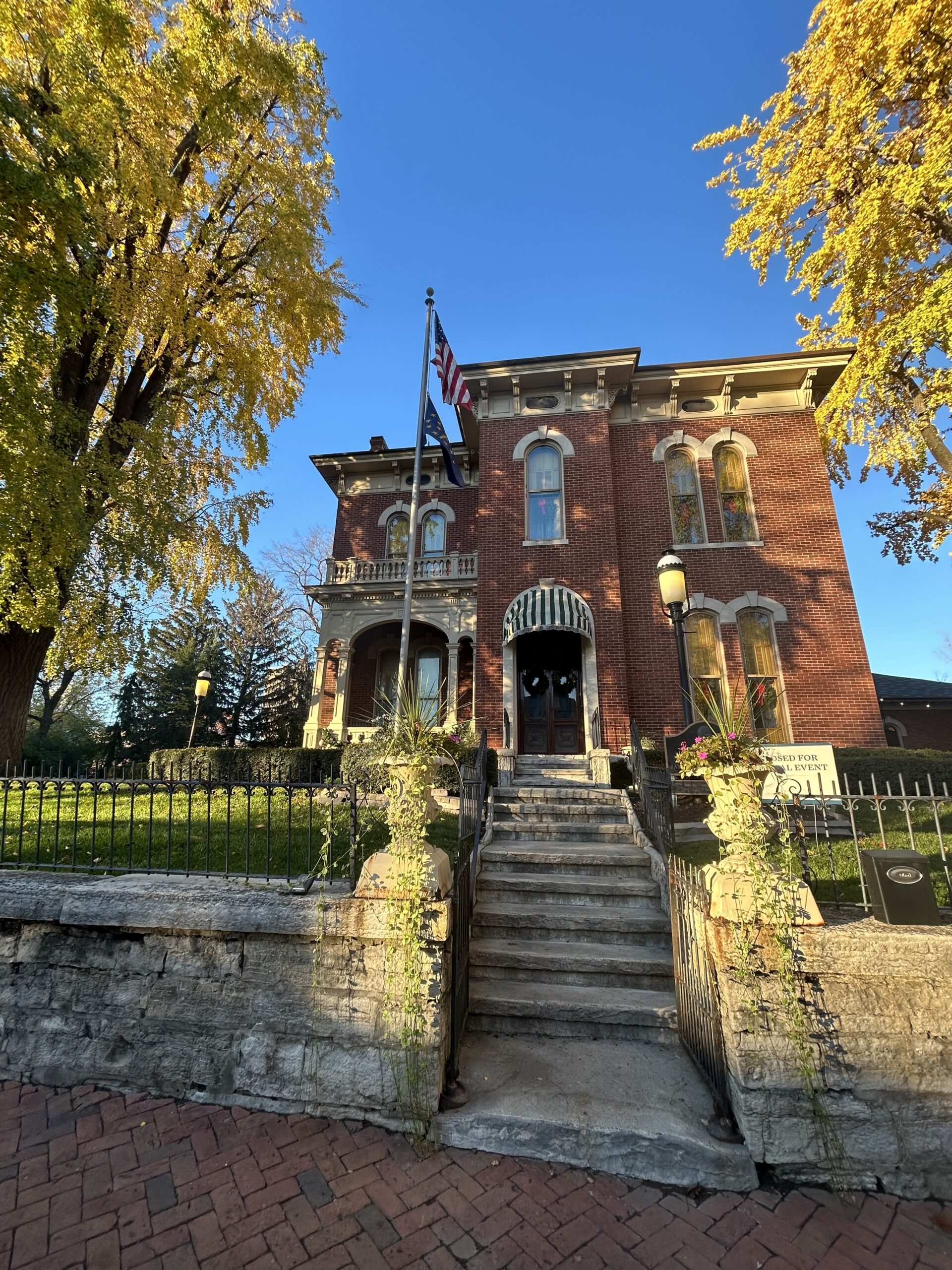AF-Indy Event Spotlight: Caleb Franz Brings Back a Hero Lost to History
On any given evening, the James Whitcomb Riley Museum Home and property would be darkened and closed to the public. The evening of Tuesday November 19, however, was a different story. That evening, history came alive at the Riley Home—not just because of the AF Director of Marketing’s period-accurate Victorian dress.
AF-Indianapolis hosted a special Pop-Up Event celebrating the release of author Caleb Franz’s new book The Conductor. In the book, Franz tells the story of the life of Rev. John Rankin, “The Founding Father of Abolitionism.” Through dedicated research, Franz brings to light a hero previously lost to history.

During the event, Franz was interviewed by AF Director of Marketing, Chloe Anagnos Pierce. Chloe asked why he chose to write about Rev. Rankin, a figure that is only mentioned in passing (if at all) during the lessons on the Antebellum period in American History class. While much ink has been spilled on major figures of the era, Franz pointed out that many others, like Rev. Rankin, made vital contributions yet remain relatively unknown. Those he calls, “folk heroes.” Franz writes,
“Our subject reminds us that not every significant historical figure is a household name. Most, in fact, are not. Some are remembered simply because they made the right choice, in the right place, at the right time. Others are scarcely remembered at all…These regional figures may not be as legendary as someone like George Washington, but they still possessed the bravery and conviction needed to contribute to the fulfillment of the vision outlined in the founding of America.”
Rev. Rankin, who lived from 1793 to 1886, advocated for immediate emancipation at a time when slavery was legally and culturally entrenched in the young United States. During the event, Franz discussed how even among abolitionists, those who supported immediate emancipation were considered radicals. This did not deter Rev. Rankin from fighting for what was right.
Franz also spoke of how Rev. Rankin’s love of country pushed him to see the promises of the Declaration of Independence achieved for all Americans. Rankin was not the kind of person to burn flags in protest or consider the constitution “a compact with the devil” like his student William Lloyd Garrison. He was more of what Franz calls a “pragmatic radical,” strategic in his advocacy but never watered down his message to appeal to a broad audience.
Rev. Rankin’s views did not make him many friends. He was forced to leave his beloved Tennessee and chose to move to Ripley, Ohio. This choice to move to a town on Ohio’s southern border highlights Rev. Rankin’s pragmatism. Franz notes that while Rev. Rankin could have moved further north or to New England, he chose to stay as close to the South while still living in a free state—exactly where his antislavery message was needed the most.
Rev. Rankin became one of the first conductors in the Underground Railroad and his home in Ripley became a stop along the way for black slaves making the journey north. Although he lived in a free state, Franz told of bounties being put on Rankin’s head. In one instance, bounty hunters looking for Rankin attempted to storm his home while he was away. Unfortunately, Rev. Rankin’s wife and children were at home and were facing down the barrels of the bounty hunters’ rifles. Fortunately, neighbors rushed to the aid of Rankin’s wife and children and thwarted the attack. Such a tight-knit community, Franz noted, helped Rev. Rankin mission be successful.

These stories enthralled the audience and Franz mentioned a desire to tell the stories of similar folk heroes in Appalachia during the abolition movement. While so much focus is given to places and people located in the northern states, Appalachia is rich in history, serving as a key bridge between bondage and freedom for families fleeing slavery.
Franz also discussed his writing style and advice for aspiring writers in the audience. Franz, a young author himself, serves as an inspiring role model, demonstrating that what matters most in writing is honing passion and ability, regardless of age.
The Pop-Up Event guests were also treated to a tour of the James Whitcomb Riley home. Riley was known as the “Hoosier Poet,” writing many famous poems for children, including “Little Orphant Annie,” which went on to inspire the comic strip “Little Orphan Annie,” spawning a Broadway Musical, as well as radio, film, and TV adaptations. Riley’s name also appears on Riley Children’s Hospital, which was founded in memory of Riley in 1924.
Thanks to America’s Future and Caleb Franz for such an amazing event. Guests were given a signed copy of The Conductor (me included), but copies are on sale now at Amazon. I look forward to writing a full review of the book for AF soon!
